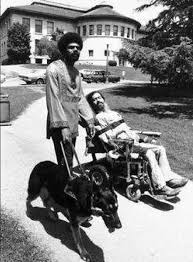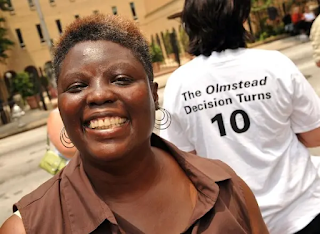Black Disabled Leaders in History
Able South Carolina is celebrating Black History Month by honoring and celebrating the work of Black leaders in the disability rights movement! Let's learn more about four important and impactful individuals who furthered disability rights.
Bradley Lomax
Sources:
- Independence Now; Black History Month Profile, Bradley Lomax
- Ark Republic, Black Disability History, Vol. I: Reclaiming the Black and Disabled experience
*****
Johnnie Lacy
Sources:
- The Center for Leaner Equity; Johnnie Lacy, an Advocate for Independent Living
- Johnnie Lacy - DRILM - University of California, Berkeley
*****
Donald Galloway
Donald Galloway earned his Master's degree in Social Work. He went on to work in the Berkeley Center for Independent Living (CIL) in the 1970’s & later directed a CIL in Washington, DC.
Upon reporting for jury duty in 1991, Mr. Galloway was dismissed from service due to being Blind. Mr. Galloway challenged this practice by suing the D.C. Superior Court. Mr. Galloway won his lawsuit, and as a result it became illegal for an individual to be excluded from jury duty due to their disability status. The court ruling specifies juries should include people with disabilities.
Source: Center for Learner Equity; Donald Galloway, Fighting for Full Participation in Society
*****
Lois Curtis
Lois Curtis was forced to live in a full-time institutional setting for disabled people during her adolescent years. Ms. Curtis desperately wanted to live among the community. In 1995, legal advocates helped Ms. Curtis file a lawsuit against the Georgia Department of Human Resources for violating the Americans with Disabilities Act of 1990 by forcing the unnecessary institutionalization of people with disabilities. Nine years later, the Supreme Court of the U.S. ruled that unnecessary institutionalization is a violation of an individual's civil rights. Ms. Curtis had won!
Until her death in late 2022, Ms. Curtis lived in the community with support systems that enabled her independence. In addition to her legacy in disability justice, she became well-known as a portrait artist and even had the opportunity to present one of her self-portraits to President Barack Obama.
Sources:
- National Women's History Museum; Biographies, Lois Curtis
- Lois Curtis, Whose Lawsuit Secured Disability Rights, Dies at 55, The New York Times
You can also read our response to her death last fall at this link.
*****
Do you enjoy learning about disability history?
Do you want to learn more?
Consider supporting us as we continue to serve people with disabilities by educating the community about the accomplishments of disabled advocates!
Able South Carolina
803.779.5121 | advocacy@able-sc.org






No comments:
Post a Comment